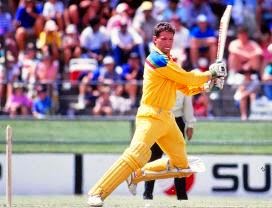A TWIST IN
THE TAIL
Australia v
West Indies (semi-final) • PCA Stadium,
Mohali (Day/Night), 14 March 1996
Mohali (Day/Night), 14 March 1996
West Indies were unlikely semi-finalists,
Australia the favourites. Even in decline the West Indies were not a team to be
trifled with. An extra effort from someone could tilt the balance. That effort,
at the outset, came from the Caribbean pacemen.
Curtly Ambrose began ominously with a huge
in-swinger that drew a gasp all around. Next ball, the prolific Mark Waugh was
trapped leg-before, hopelessly late on his elegant defensive stroke. Brian Lara
dropped Mark Taylor in the slips off Ian Bishop. But Taylor edged a Bishop
delivery on to the stumps in the fourth over. Two down for 7, and only one run
from the bat. That was off the dropped catch. Ricky Ponting was stranded in
front of the sticks by another Ambrose special. Three down for 8 off 4.5 overs.
Bishop had the resolute Steve Waugh’s bails flying. It was disaster at 15 for
four after 9.1 overs.
Stuart Law and Michael Bevan dug in as Courtney
Walsh bowled a thrifty spell. The wicket lost its bite, so did the bowling.
Rookie Otis Gibson was hit for 13 runs in two overs. The pressure eased. The
pair posted 138 in 32 overs, Australian fifth-wicket World Cup record. Law was
run out for 72. As often happens, Bevan left soon for 69. Ian Healy hit 31 off
28 balls. But a score of 207 did not seem enough.
Despite the early loss of makeshift opener
Courtney Browne off Shane Warne's first delivery, left-handers Shivnaraine
Chanderpaul and Lara batted untroubled, keeping pace with the asking-rate. Lara
was in sparkling form, scoring 45 at a run-a-ball and carving out four
boundaries. He got a beauty from Steve Waugh that dislodged the off bail. The
stand was worth 68 runs in 16.5 overs. Skipper Richie Richardson filled the
breach admirably. Chanderpaul got cramps. Soon Glenn McGrath had him caught for
80 off 126 balls with 7 fours. Another 43 were required off 50 balls.
Dew had begun to fall as the evening wore on.
McGrath had Roger Harper leg-before. Skipper Taylor pulled out his last trick,
Shane Warne. Gibson was promoted to hit out but Warne was too wily. Even the
unflappable Jimmy Adams could not bear the pressure. The fabled Warne flipper
fooled him. Keith Arthurton, woefully out of touch, had collected two runs in
four innings. He was far too nervous, swung wildly at Damien Fleming, edged to
a jubilant Healy, and failed to add to his miserable tally. With 20 required
off 14 balls, Richardson had just nine, ten and jack for company. Warne’s
perfectly pitched flipper in the 49th over left Bishop clueless.
Warne grabbed three wickets for 6 runs in his
third spell of 3 overs. He recounted later: "I was really pumped up. When
we got Chanderpaul we knew we had a very good chance. It is important to bowl a
tight line and length under the circumstances rather than spin the ball
prodigiously."
West Indies needed 10 runs in the final over
with two wickets left. Richardson blasted the first ball to the mid-wicket
boundary. Excitement reached fever pitch. There were six runs to win off 5
balls. Surely the captain would see them through. But this was not a situation
for rational acts. As the ball streaked to the wicketkeeper, Ambrose took off
for a single and just failed to make it. Six to get off 4 balls. The role did
not suit last man Walsh. Richardson watched helplessly. Fleming, accurate and
nippy, made the ball skid. Walsh had no idea what he was supposed to do. Before
he could decide, the ball crashed into his stumps. Australia had conjured
another of cricket’s legendary tales. West Indies were in control for 91 overs.
They did not know how to handle the final nine.
Australia : 207 for 8 wickets (50 overs)
West Indies : 202 all out (49.3 overs)
(Author Indra Vikram Singh can be contacted
on email singh_iv@hotmail.com).
The
Big Book of World Cup Cricket 1975-2011
ISBN
978-81-901668-4-3
Distributed
in India by Variety Book Depot, Connaught Place, New Delhi, Phones + 91 11
23417175, 23412567
Available
in leading bookshops, and online on several websites.






